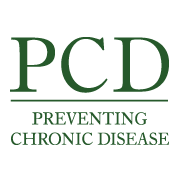PCD News Summary for February 23, 2017

About the Journal
Published every Thursday, Preventing Chronic Disease (PCD) is a peer-reviewed online journal established by CDC’s National Center for Chronic Disease Prevention and Health Promotion. The News Media Branch prepares press summary packets each week. To receive these press summaries on an embargoed basis, send an e-mail to media@cdc.gov. Please note that this e-mail list is for credentialed journalists only. All others, please visit Hookup to Health to sign up for e-mail updates
Notice to News Media - PCD Release Time and Embargo Policy:
CDC’s News Media Branch releases to reporters the PCD media packet every Tuesday afternoon between 12 and 2 pm.
Embargoed until Thursday, February 23, at 12:00 PM ET
Feasibility Pilot of a Randomized Faith-Based Intervention to Reduce Secondhand Smoke Exposure Among Korean Americans
Melissa Newton
mnewton@cdc.gov
404-718-6281
Faith-based, culturally tailored programs could help reduce secondhand smoke exposure among Korean Americans. San Diego State University researchers pilot-tested an intervention to address secondhand smoke among nonsmokers of Korean descent. In collaboration with 11 Korean churches in southern California, a pilot cluster randomized intervention trial was conducted with 75 nonsmoking Korean adults. The intervention comprised motivational phone interviewing, educational materials, logo items, and church-based group activities on secondhand smoke; the control group received the same type and frequency of intervention components, but on fruit and vegetable consumption. After the intervention, a larger percentage of the intervention group than the control group reported accurate knowledge and disapproval of secondhand smoke. The intervention group’s self-reported secondhand smoke exposure, which was measured by the number of cigarettes smoked in their presence, was reduced by 8.5 cigarettes per week; in contrast, a reduction of 1 cigarette per week occurred among the control group.
Cost-Effectiveness Analysis of Four Simulated Colorectal Cancer Screening Interventions, North Carolina
Melissa Newton
mnewton@cdc.gov
404-718-6281
Using simulated screening interventions, researchers identified mailed reminders for Medicaid enrollees, mass-media campaigns targeting African Americans, and colonoscopy vouchers for the uninsured as the most cost-effective ways to target disparities in colorectal cancer screening. Researchers used computer modeling to project population-level outcomes of four evidence-based and stakeholder-informed intervention scenarios over a 10-year period (January 1, 2014, through December 31, 2024). In the model, they compared the proportion of people living in North Carolina ages 50 to 75 years at some point during the 10-year period who were up to date with colorectal cancer screening recommendations across intervention scenarios, both overall and among groups with documented disparities in receiving screenings. The model showed that mailed reminders for Medicaid enrollees, mass-media campaigns targeting African Americans, and colonoscopy vouchers for the uninsured would be expected to reduce screening disparities by 2023, but would be expected to produce only small increases in overall screening rates. Increased screenings ranged from 41,709 additional life-years up to date with screening for the voucher intervention to 145,821 for the mass-media intervention. Modeling showed that reminders mailed to Medicaid enrollees and the mass-media campaign for African Americans were projected to be the most cost-effective interventions, with costs per additional life-year up to date with screening of $25 or less.
###
Note: Not all articles published in PCD represent work done at CDC. In your stories, please clarify whether a study was conducted by CDC (“a CDC study”) or by another institution (“a study published by CDC”). The opinions expressed by authors contributing to PCD do not necessarily reflect the opinions of CDC or the institutions with which the authors are affiliated. PCD requests that, when possible, you include a live link to the article in your stories.
###
U.S. DEPARTMENT OF HEALTH AND HUMAN SERVICES
CDC works 24/7 protecting America’s health, safety and security. Whether diseases start at home or abroad, are curable or preventable, chronic or acute, stem from human error or deliberate attack, CDC is committed to respond to America’s most pressing health challenges.
- Page last reviewed: February 23, 2017
- Page last updated: February 23, 2017
- Content source:
Error processing SSI file


 ShareCompartir
ShareCompartir